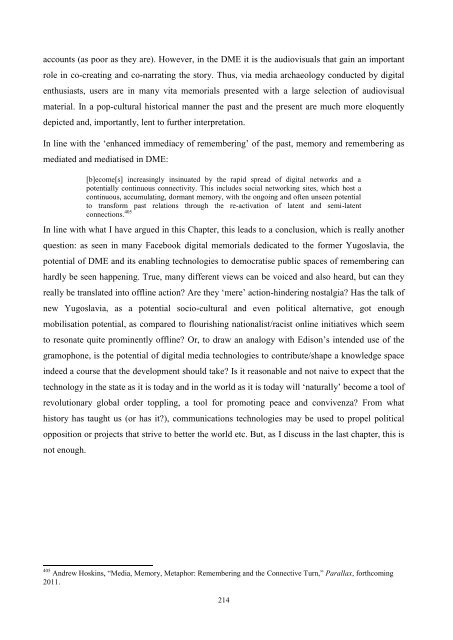UNIVERSITY OF NOVA GORICA GRADUATE SCHOOL ...
UNIVERSITY OF NOVA GORICA GRADUATE SCHOOL ...
UNIVERSITY OF NOVA GORICA GRADUATE SCHOOL ...
You also want an ePaper? Increase the reach of your titles
YUMPU automatically turns print PDFs into web optimized ePapers that Google loves.
accounts (as poor as they are). However, in the DME it is the audiovisuals that gain an important<br />
role in co-creating and co-narrating the story. Thus, via media archaeology conducted by digital<br />
enthusiasts, users are in many vita memorials presented with a large selection of audiovisual<br />
material. In a pop-cultural historical manner the past and the present are much more eloquently<br />
depicted and, importantly, lent to further interpretation.<br />
In line with the ‗enhanced immediacy of remembering‘ of the past, memory and remembering as<br />
mediated and mediatised in DME:<br />
[b]ecome[s] increasingly insinuated by the rapid spread of digital networks and a<br />
potentially continuous connectivity. This includes social networking sites, which host a<br />
continuous, accumulating, dormant memory, with the ongoing and often unseen potential<br />
to transform past relations through the re-activation of latent and semi-latent<br />
connections. 405<br />
In line with what I have argued in this Chapter, this leads to a conclusion, which is really another<br />
question: as seen in many Facebook digital memorials dedicated to the former Yugoslavia, the<br />
potential of DME and its enabling technologies to democratise public spaces of remembering can<br />
hardly be seen happening. True, many different views can be voiced and also heard, but can they<br />
really be translated into offline action? Are they ‗mere‘ action-hindering nostalgia? Has the talk of<br />
new Yugoslavia, as a potential socio-cultural and even political alternative, got enough<br />
mobilisation potential, as compared to flourishing nationalist/racist online initiatives which seem<br />
to resonate quite prominently offline? Or, to draw an analogy with Edison‘s intended use of the<br />
gramophone, is the potential of digital media technologies to contribute/shape a knowledge space<br />
indeed a course that the development should take? Is it reasonable and not naive to expect that the<br />
technology in the state as it is today and in the world as it is today will ‗naturally‘ become a tool of<br />
revolutionary global order toppling, a tool for promoting peace and convivenza? From what<br />
history has taught us (or has it?), communications technologies may be used to propel political<br />
opposition or projects that strive to better the world etc. But, as I discuss in the last chapter, this is<br />
not enough.<br />
405 Andrew Hoskins, ―Media, Memory, Metaphor: Remembering and the Connective Turn,‖ Parallax, forthcoming<br />
2011.<br />
214

















